Global investment in nature-based water security solutions has seen a sharp rise, doubling since 2013. These solutions include wetland restoration, forest management, and green infrastructure projects. Experts say the increase is helping communities manage floods and droughts while protecting the environment.
Nature-based approaches offer multiple benefits. By restoring wetlands, forests, and riverbanks, these projects reduce the impact of floods and improve water quality. They also help store carbon and preserve biodiversity, making them a key strategy in climate resilience.
According to recent reports, countries and private investors are increasingly funding nature-based projects to secure water supplies. Investments have grown steadily over the past decade, reflecting recognition of the value of natural systems in managing water risks.
Wetlands, for example, act as natural sponges. They absorb excess water during heavy rains and slowly release it during dry periods. Forests play a similar role, filtering water and stabilizing soil to prevent erosion. Green infrastructure, such as urban parks and permeable pavements, also helps cities manage stormwater effectively.
Environmental scientists emphasize that nature-based water security is not only cost-effective but also sustainable. Unlike traditional concrete-based infrastructure, natural solutions provide long-term protection and enhance the surrounding ecosystem.
The growth in investment highlights a shift in policy and planning. Governments are increasingly integrating nature-based solutions into water management strategies. This approach supports both human communities and wildlife, promoting healthier rivers, lakes, and wetlands.
Experts note that while funding has doubled, there is still significant potential to expand these projects globally. Developing regions, which face high flood and drought risks, could benefit the most from targeted investments.
In addition to reducing flood and drought risks, nature-based water security projects create jobs and support local economies. Communities involved in wetland restoration or reforestation often gain employment and training opportunities while contributing to environmental protection.
The United Nations and other global organizations have also endorsed nature-based solutions as a key tool in climate adaptation. They recommend scaling up investment to ensure water security, protect biodiversity, and meet international climate goals.
Analysts believe that the momentum for nature-based water security will continue. As climate change intensifies, the demand for resilient and sustainable water management solutions grows. Investors and policymakers see natural infrastructure as a reliable and efficient way to address these challenges.
By focusing on restoration and green infrastructure, the global community is making progress toward water security that benefits both people and the planet. Nature-based solutions are now considered essential in building resilience against climate-related disasters.
The doubling of investment since 2013 underscores the growing recognition of these strategies. As more countries adopt nature-based water security measures, experts hope for a future where floods and droughts are less damaging, biodiversity is protected, and communities are better prepared for climate challenges.


